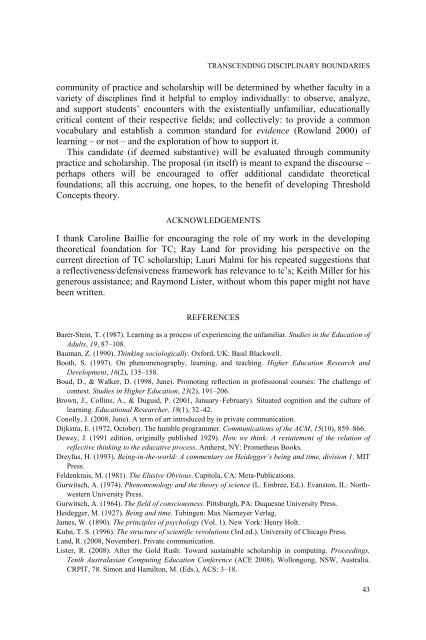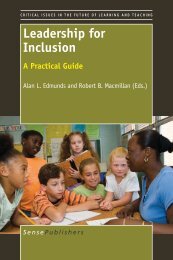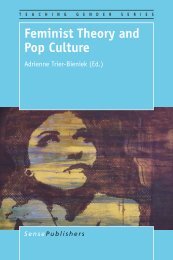TRANSCENDING DISCIPLINARY BOUNDARIEScommunity of practice <strong>and</strong> scholarship will be determined by whether faculty in avariety of disciplines find it helpful to employ individually: to observe, analyze,<strong>and</strong> support students’ encounters with the existentially unfamiliar, educationallycritical content of their respective fields; <strong>and</strong> collectively: to provide a commonvocabulary <strong>and</strong> establish a common st<strong>and</strong>ard for evidence (Rowl<strong>and</strong> 2000) of<strong>learning</strong> – or not – <strong>and</strong> the exploration of how to support it.This c<strong>and</strong>idate (if deemed substantive) will be evaluated through communitypractice <strong>and</strong> scholarship. The proposal (in itself) is meant to exp<strong>and</strong> the discourse –perhaps others will be encouraged to offer additional c<strong>and</strong>idate theoreticalfoundations; all this accruing, one hopes, to the benefit of developing ThresholdConcepts theory.ACKNOWLEDGEMENTSI thank Caroline Baillie for encouraging the role of my work in the developingtheoretical foundation for TC; Ray L<strong>and</strong> for providing his perspective on thecurrent direction of TC scholarship; Lauri Malmi for his repeated suggestions thata reflectiveness/defensiveness framework has relevance to tc’s; Keith Miller for hisgenerous assistance; <strong>and</strong> Raymond Lister, without whom this paper might not havebeen written.REFERENCESBarer-Stein, T. (1987). Learning as a process of experiencing the unfamiliar. Studies in the Education ofAdults, 19, 87–108.Bauman, Z. (1990). Thinking sociologically. Oxford, UK: Basil Blackwell.Booth, S. (1997). On phenomenography, <strong>learning</strong>, <strong>and</strong> teaching. Higher Education Research <strong>and</strong>Development, 16(2), 135–158.Boud, D., & Walker, D. (1998, June). Promoting reflection in professional courses: The challenge ofcontext. Studies in Higher Education, 23(2), 191–206.Brown, J., Collins, A., & Duguid, P. (2001, January–February). Situated cognition <strong>and</strong> the culture of<strong>learning</strong>. Educational Researcher, 18(1), 32–42.Conolly, J. (2008, June). A term of art introduced by in private communication.Dijkstra, E. (1972, October). The humble programmer. Communications of the ACM, 15(10), 859–866.Dewey, J. (1991 edition, originally published 1929). How we think: A restatement of the relation ofreflective thinking to the educative process. Amherst, NY: Prometheus Books.Dreyfus, H. (1993). Being-in-the-world: A commentary on Heidegger’s being <strong>and</strong> time, division 1. MITPress.Feldenkrais, M. (1981). The Elusive Obvious. Capitola, CA: Meta-Publications.Gurwitsch, A. (1974). Phenomenology <strong>and</strong> the theory of science (L. Embree, Ed.). Evanston, IL: NorthwesternUniversity Press.Gurwitsch, A. (1964). The field of consciousness. Pittsburgh, PA: Duquesne University Press.Heidegger, M. (1927). Being <strong>and</strong> time. Tubingen: Max Niemeyer Verlag.James, W. (1890). The principles of psychology (Vol. 1). New York: Henry Holt.Kuhn, T. S. (1996). The structure of scientific revolutions (3rd ed.). University of Chicago Press.L<strong>and</strong>, R. (2008, November). Private communication.Lister, R. (2008). After the Gold Rush: Toward sustainable scholarship in computing. Proceedings,Tenth Australasian Computing Education Conference (ACE 2008), Wollongong, NSW, Australia.CRPIT, 78. Simon <strong>and</strong> Hamilton, M. (Eds.), ACS: 3–18.43
SCHWARTZMANLoder, J. (1981). The transforming moment: Underst<strong>and</strong>ing convictional experiences. San Francisco,CA: Harper & Row.Meyer, J., & L<strong>and</strong>, R. (2005). Threshold <strong>concepts</strong> <strong>and</strong> troublesome knowledge (2): Epistemologicalconsiderations <strong>and</strong> a conceptual framework for teaching <strong>and</strong> <strong>learning</strong>. Higher Education, 49, 373–388.Mezirow, J. (1991). Transformative dimensions of adult <strong>learning</strong>. San Francisco, CA: Jossey-Bass.Nietzsche, F. (1974 edition). Twilight of the idols. In L. Karl & L. Hamalian (Eds.), The existentialmind: Documents <strong>and</strong> fiction. Greenwich, CN: Facett Publications.Padfield, C. (1997, April). The role of research <strong>and</strong> reflection in <strong>learning</strong> from experience: Implicationsfor universities. Industry <strong>and</strong> Higher Education, 11(2), 91–95.Plack, M., & Greenberg, L. (2005, December). The reflective practitioner: Reaching for excellence inpractice. Pediatrics, 116(16), 1546–1552.Rowl<strong>and</strong>, S. (2000). The enquiring university teacher. Buckingham, UK: Society for Research intoHigher Education (SRHE) <strong>and</strong> Open University Press.Schwartzman, L. (2007). Student defensiveness as a <strong>threshold</strong> to reflective <strong>learning</strong> in software design.Informatics in Education, 6(1), 197–214.Schwartzman, L. (2008). Student Transformative Learning in Software Engineering <strong>and</strong> Design:discontinuity (pre)serves meaning, 7th Baltic Sea Conference on Computing Education Research(Koli Calling 2007), Koli National Park, Finl<strong>and</strong>, November 15–18, 2007; Proceedings Conferencesin Research <strong>and</strong> Practice in Information Technology (CRPIT) © 2008, v 88, R. Lister <strong>and</strong> Simon(Eds.)Segal, S. (1999). The existential conditions of explicitness: An heideggerian perspective. Studies inContinuing Education, 21(1), 73–89.Simon, H. (1996). The sciences of the artificial (3rd ed.). Cambridge, MA: MIT Press.Turner, V. (1969). The ritual process, structure <strong>and</strong> Anti-structure. London: Routledge <strong>and</strong> Kegan Paul.Leslie SchwartzmanChicagoIllinoisUSAsla @ acm.org44
- Page 1 and 2:
EDUCATIONAL FUTURES: RETHINKING THE
- Page 3 and 4:
EDUCATIONAL FUTURESRETHINKING THEOR
- Page 5 and 6:
A C.I.P. record for this book is av
- Page 7 and 8:
TABLE OF CONTENTS10. Threshold Conc
- Page 9 and 10:
Pax Intrantibus Salus Exeuntibus. L
- Page 11 and 12:
LAND ET ALstudents experience diffi
- Page 13 and 14:
LAND ET ALModePreliminalLiminalPost
- Page 15 and 16:
LAND ET AL(Barker, 1991, p.184). Th
- Page 17 and 18:
LAND ET ALvariations arising from t
- Page 19 and 20:
LAND ET ALform of a model of concep
- Page 21 and 22:
LAND ET ALQuestions of intersection
- Page 24 and 25:
EDITORS’ PREFACEstudents bring to
- Page 26 and 27:
EDITORS’ PREFACEconcepts in the f
- Page 28 and 29:
EDITORS’ PREFACEIn the final illu
- Page 30 and 31:
EDITORS’ PREFACEhence becomes a n
- Page 32 and 33:
EDITORS’ PREFACElearning. This th
- Page 34 and 35:
EDITORS’ PREFACEa lens or ‘way
- Page 36 and 37:
EDITORS’ PREFACEHence learning is
- Page 38 and 39:
EDITORS’ PREFACEthe Communitas, w
- Page 40 and 41: EDITORS’ PREFACEBuilding on these
- Page 42 and 43: EDITORS’ PREFACECousin, G. (2009)
- Page 44 and 45: DAVID PERKINSFOREWORDEntrance…and
- Page 46: FOREWORDMeyer, J.H.F., Land, R. & D
- Page 50 and 51: JULIE A. TIMMERMANS1. CHANGING OUR
- Page 52 and 53: CHANGING OUR MINDSKegan’s (1982)
- Page 54 and 55: CHANGING OUR MINDSKegan describes e
- Page 56 and 57: CHANGING OUR MINDSIn fact, Kegan an
- Page 58 and 59: CHANGING OUR MINDSat the epistemolo
- Page 60 and 61: CHANGING OUR MINDSMight a learner r
- Page 62 and 63: CHANGING OUR MINDSreveals an additi
- Page 64 and 65: CHANGING OUR MINDSBendixen, L. D.,
- Page 66: CHANGING OUR MINDSSibbett, C., & Th
- Page 69 and 70: SCHWARTZMANScholarship in liminalit
- Page 71 and 72: SCHWARTZMANTC: the entityThe term T
- Page 73 and 74: SCHWARTZMANA resource for teaching
- Page 75 and 76: SCHWARTZMANunprecedented to attract
- Page 77 and 78: SCHWARTZMANspectrum of scholarship
- Page 79 and 80: SCHWARTZMANrupture and phenomenolog
- Page 81 and 82: SCHWARTZMANfield(s) of one’s cons
- Page 83 and 84: SCHWARTZMAN36DATA: PARTICULARS GIVI
- Page 85 and 86: SCHWARTZMANchallenge than interpret
- Page 87 and 88: SCHWARTZMANStrategies for Teaching:
- Page 89: SCHWARTZMANThey are redefined here




